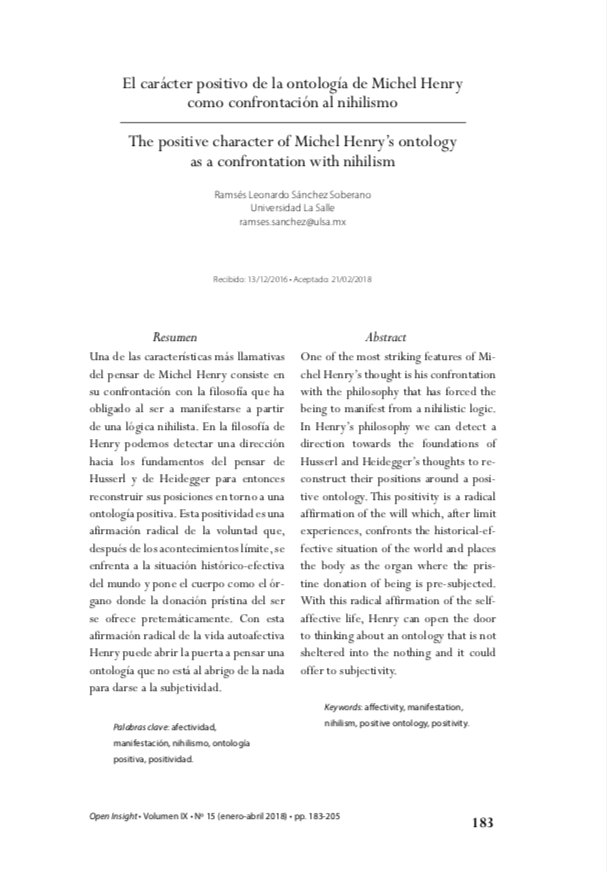The positive character of Michel Henry's ontology as a confrontation with nihilism
Abstract
One of the most striking features of Michel Henry's thought is his confrontation with the philosophy that has forced the being to manifest from a nihilistic logic. In Henry's philosophy we can detect a direction towards the foundations of Husserl and Heidegger's thoughts to reconstruct their positions around a positive ontology. This positivity is a radical affirmation of the will which, after limit experiences, confronts the historical-effective situation of the world and places the body as the organ where the pristine donation of being is pre-subjected. With this radical affirmation of the self-affective life, Henry can open the door to thinking about an ontology that is not sheltered into the nothing and it could offer to subjectivity.References
Bernet, R. (1994). La vie du sujet. Recherches sur l’interprètation de Husserl dans la phénoménologie. Paris: Épiméthée: Presses universitaires de France.
Heidegger, M. (1987). Einführung in die Metaphysik. Tübingen: Max Niemeyer Verlag Tübingen.
Heidegger, M. (1992). GA 19, Platon: Sophistes (Winter semester 1924/25). Frankfurt: ed. I. Schüssler.
Heidegger, M. (1994). GA 20, Prolegomena zur Geschichte des Zeitbegriffs (Summer semester 1925). Frankfurt: ed. P. Jaeger.
Heidegger, M. (1994). GA 61, Phänomenologische Interpretationen zu Aristoteles. Einführung in die phänomenologische Forschung (Winter semester 1921/22). Frankfurt: ed. W. Bröcker et K. Bröcker-Oltmanns.
Heidegger, M. (2001). Sein und Zeit. Tübingen: Max Niemeyer Verlag Tübingen.
Henry, M. (1985). Généalogie de la Psychanalyse. Le commencement perdu. Paris: Épiméthée, PUF.
Henry, M. (1985). L’essence de la manifestation. Paris: Épiméthée, Presses universitaires de France.
Henry, M. (1987). La Barbarie. Paris: Le livre de Poche.
Henry, M. (1996). C’est Moi la Vérité. Pour une philosophie du christianisme. Paris: Éd. Du Seuil.
Henry, M. (2000). Incarnation. Une philosophie de la chair. Paris: Éd. Du Seuil.
Henry, M. (2001). Encarnación. Salamanca: Ediciones Sígueme.
Henry, M. (2002). Paroles du Christ. Paris: Éd. Du Seuil.
Henry, M. (2003). De la subjectivité. Tome II. Phénoménologie de la vie. Paris: Épiméthée, Presses universitaires de France.
Henry, M. (2007). Entretiens. Paris: Éd. Arles, Sulliver.
Henry, M. (2007). Filosofía y fenomenología del cuerpo. Salamanca: Ediciones Sígueme.
Henry, M. (2010). Pour une phénoménologie de la vie. Paris: Éditions de Corlevour.
Henry, M. (2012). Revue Internationale Michel Henry. No. 3. Louvain: UCL Presses Universitaires de Louvain.
Henry, M. (2013). La fenomenología radical, la cuestión de Dios y el problema del mal. Madrid: Ediciones Encuentro.
Leclercq, J. et A. Henry, (2009). Cahier Michel Henry. J. Leclerq et J-M. Brohm (Eds.). Paris, Lausanne: Éditions de l’Âge d’Homme.





